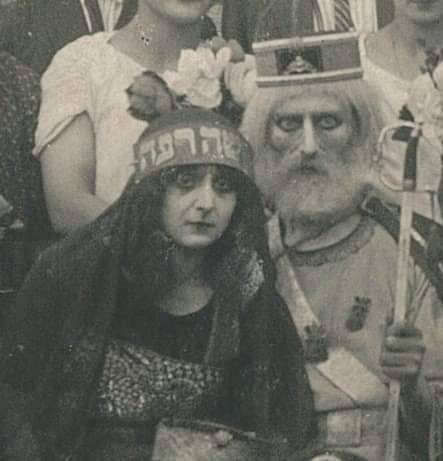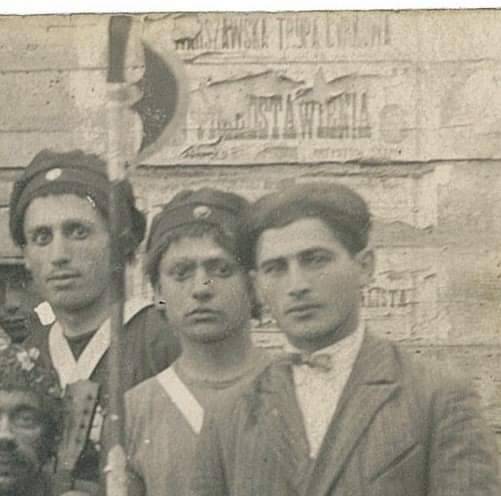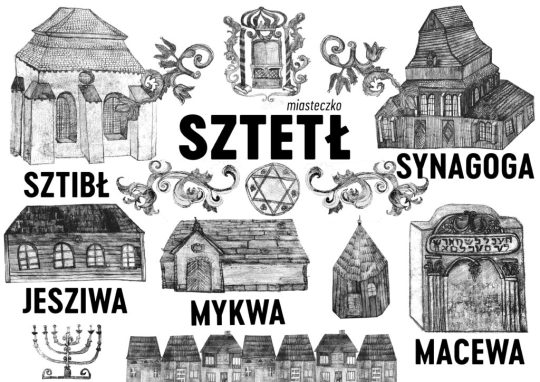#Shtetl
Explore tagged Tumblr posts
Text
I don't know what Ashkenazi needs to hear this but the old country sucked and the shtetl isn't your homeland.
#I think this comes off as more aggressive than I meant it#Also I'm bitches#fuzzytheduck#ashkenazi#jumblr#judaism#jewish history#jewish stuff#jewish#frumblr#antisemitism#Shtetl#old country#am yisrael chai
724 notes
·
View notes
Text



Picture of an amateur Yiddish Troupe from a Polish shtetl in mid-1920s. The poster in the back describes a circus that was previously in town. The woman's headband is in Hebrew and reads "a wicked woman."
Source: Yiddish Research on Facebook
#jumblr#jewish#jews#nesyapost#jewish history#jewish culture#yiddish#shtetl#jewish art#troupe#1920s Poland#Poland#black and white
492 notes
·
View notes
Text

Drawing by Klaudia Kiercz-Długołęcka
Sztetł
Yiddish - שטעטל
English transcription - Shtetl
Meaning - a town
Sztibł
Yiddish - שטיבל
English transcription - Shtibl
Meaning - a house or a room used for communal Jewish prayer
Jesziwa
Yiddish - ישיבֿה
English transcription - Yeshiva
Meaning - a traditional Jewish educational institution focused on the study of the Talmud
Mykwa
Yiddish - מיקווה
English transcription - Mikvah
Meaning - a bath used for the purpose of ritual immersion to achieve ritual purity
Synagoga (this one is in Polish)
Yiddish - שול
English transcription - shul
Meaning - synagogue
Macewa
Yiddish - מצבֿה
English transcription - Matzevah
Meaning - a headstone or tombstone marking a Jewish grave
#jewish#jews#jewish culture#jewish history#yiddish#yiddish culture#yiddish language#learning yiddish#ashkenazi#ashkenazi jews#polish Jews#jews in poland#yiddish words#shtetl#shtibl#yeshiva#mikvah#shul#matzevah#jidysz#yidish#ייִדיש#Żydzi w Polsce#żydowska kultura#judaica#jeśli zapomnę o tobie Jerozolimo niech uschnie moja prawica#yiddish dictionary#jumblr
247 notes
·
View notes
Text

Jonasz Stern (1904-1988) — Shtetl Kałusz in 1942 [charcoal, fabric, oil, enamel, on wood, 1988]
166 notes
·
View notes
Text
reading up on Jewish history for a class I'm in and...fuck. learning about the complete and total extermination of the shtetl is breaking me. I don't have Shoah trauma nor do I ever expect to (my family is Catholics all the way down) but seeing these artistic depictions of vibrant Jewish life in Europe hurts my heart; it's the same when I watch Fiddler. I don't know that we'll ever have it back and it makes me cry.
64 notes
·
View notes
Text

Jewish village near Chelm, eastern Poland circa 1916-18.
148 notes
·
View notes
Text
Talk by author Arthur Kurzweil
"The Persistence of Memory: My Father's Ukrainian Shtetl--A Holocaust Reckoning" by Arthur Kurzweil will be presented online by JewishGen at 1 p.m. CST, Wednesday, Dec. 6, 2023. Pay-what-you-wish registration is at: https://898a.blackbaudhosting.com/898a/JewishGen-Talks-The-Persistence-of-Memory-My-Fathers-Ukrainian-Shtetl--A-Holocaust-Reckoning
3 notes
·
View notes
Text
Abrasha Rotenberg: “Esencialmente, me siento un judío argentino”
🇦🇷✡️ Abrasha Rotenberg (nacido en 1926 en Ucrania) es un hombre cuya vida abarca varias décadas y continentes. Habiendo vivido en un shtetl (aldea judía) en su infancia, luego se trasladó a Magnitogorsk y a Moscú durante el régimen de Stalin. En 1933, su familia emigró a Argentina, donde se formó como persona y como parte de la comunidad judía. Fue sociólogo, editor y escritor, además de trabajar al lado de Jacobo Timerman en proyectos como las revistas Primera Plana y Confirmado y el diario La Opinión. A raíz de su trabajo, sufrió persecuciones políticas, lo que lo llevó a exiliarse en España, donde fue testigo de la caída del franquismo. En su vida personal, se casó con la cantante Dina Rot y tuvo dos hijos: la actriz Cecilia Roth y el músico Ariel Rot. A sus 84 años, Abrasha se considera un judío argentino, enfatizando la pluralidad del judaísmo y cómo las experiencias de exilio han moldeado su identidad. Reflexiona sobre la vida política en Israel y la diáspora, destacando las diferencias en la integración y las tensiones que se viven hoy en el país. Su obra literaria, como su libro Última carta de Moscú, aborda temas de identidad, exilio y la ética judía.
🇺🇸 Abrasha Rotenberg (born in 1926 in Ukraine) is a man whose life spans several decades and continents. Having lived in a shtetl (Jewish village) in his childhood, he later moved to Magnitogorsk and Moscow during Stalin's regime. In 1933, his family emigrated to Argentina, where he formed his identity and became part of the Jewish community. He worked as a sociologist, editor, and writer, collaborating with Jacobo Timerman on projects such as the magazines Primera Plana and Confirmado, and the newspaper La Opinión. Due to his work, he faced political persecution, leading to his exile in Spain, where he witnessed the fall of Francoism. Personally, he married singer Dina Rot and had two children: actress Cecilia Roth and musician Ariel Rot. At 84 years old, Abrasha considers himself a Jewish Argentine, emphasizing the plurality of Judaism and how exile experiences shaped his identity. He reflects on the political life in Israel and the diaspora, highlighting differences in integration and the tensions faced by the country today. His literary work, like his book Última carta de Moscú, tackles themes of identity, exile, and Jewish ethics.
#Judío#Argentina#Exilio#Franco#Israel#Diáspora#Timerman#Palermo#Moscú#Cecilia Roth#Ariel Rot#Literatura#Ethica#Sociología#Shtetl#Música#Cultura#Historia#Hebreo#Judaísmo#asquenszí#sefardí#sephardic#judaism#jewish
1 note
·
View note
Text
I cried many times during Yiddish Fiddler, starting right at the beginning when I realized they had somehow resurrected my dear departed grandmother to play Yente. She did a fine job, I was so proud of her.
There was a much more realistic view of the hardships and dangers of shtetl life in the 2018 horror film "The Golem." Though tonally very different from the others here, of course.
If I wasn't getting ready for Shabbat and had the spoons for it I'd talk about how "classic" Jewish productions like 'Yentl' and 'Fiddler' deliberately present a sanitized and idealized version of Shtetl life and Jewish culture and history, when in reality living in the Shtetls was a life of poverty and constant terror and people weren't dancing around petting chickens and goats all the time and singing and actually pogroms happened all the time and children often died or were kidnapped before they reached adulthood and sometimes Jews were just outright forced to leave their villages and leave all their possessions behind and all the while in the Shtetls they were treated as the permanent underclass, underneath even the gentile serfs and had constant restrictions on their dress, their food, and their economy. This contributes to a warped view of Shtetl life even within Jewish communities, where they romanticize the "good old days" of the Shtetl before the Holocaust when in reality there were never any "good old days" because the Shtetl itself was a symbol of forced social isolation and oppression, and antisemitism always existed in Europe long before the Holocaust. And because most of the Jews who've lived in these conditions have died, new generations of Jews are growing up with a distorted narrative of their own history.
1K notes
·
View notes
Text
Jewish Shtetl Miku!

Her necklace is an amulet of protection, and the colors she's wearing are also protective
#All jews are welcome on this post#Jumblr#Jewish miku#hatsune miku#Jewish history#am yisrael chai#To be clear the shtetl sucked there's a reason she has so much protective stuff i don't mean to glorify it
303 notes
·
View notes
Text
NOOOOOOOOO THE SHTETL ROMANTICIZING TUMBLR ACCOUNTS HAVE FOUND MY BLOG :((((
#wentz.txt#you don't want a shtetl#you yearn for a place to live where everyone cares for one another and you don't have to rely on corporations for support#you yearn for a kibbutz#you don't want to go back to the time when children starved to death
102 notes
·
View notes
Text
So... have I mentioned I'm about to release a 450,000-word Jewish historical fantasy interactive fiction game? Here's an interview I did with my publisher, Choice of Games, about it.
#ghost#golem#interactive fiction#historical fantasy#jewish history#judaism#jewish culture#jumblr#late 19th century#1880s#russian empire#magic#klezmers#sexy anarchist klezmers#talmudic debates#shtetl slapstick#isaac bashevis singer vibes#sholom aleichem vibes#I. L. Peretz vibes#choice of games#benjamin rosenbaum#save your shtetl#or not#450#writing life
207 notes
·
View notes
Text


Mayer Kirshenblatt (1916–2009) was a Polish-born Canadian self-taught painter and author of Jewish origin.
#art#jidysz#jewish culture#jews in poland#jewish history#yiddish culture#poland#jewish#Mayer Kirshenblatt#jewish artist#jewish art#opatów#sztetl#shtetl#shtetlekh#polin
35 notes
·
View notes
Text

Katarzyna Karpowicz—The Last Wedding in the Shtetl (oil on canvas, 2020)
167 notes
·
View notes
Text
As I've gotten deeper in conversion, I have increasingly imagined jewish life throughout time. And what I mean by that is...
So when I looked at the Western Wall before this (maybe a few years ago), I just saw a wall. It held no deeper meaning than that. I imagined nothing when I saw that.
But now when I look at the wall or even when I'm praying idly, I'm imagining myself in the temple when it stood there. It's bright outside - a summer day so bright, I think the temple will blind me. A soft wind surrounds me. I'm stood in the middle of a huge crowd of people, simply observing. Women pass by me in small crowds, laughing and talking. Some of these women are wrangling their small children who keep running away, laughing like it's a game. And men walk by smelling of spices. The air is light, the city around bustling with people living fulfilling, meaningful jewish life. The wall now symbolizes that jewish life, and even though it's not just about the temple when I imagine it, it means something to me.
I think that's the result of seeing myself in judaism, turning the "you" into a "we," and I feel about this what I must imagine a married couple feels.
#jumblr#jew by choice#jewish conversion#personal thoughts tag#long post#obviously i know this isn't how the temple *must* have or even *would have* been#i know only a *little* about the temple#but when i see the western wall it isn't *just* about the temple to me. it's about the temple AND then some#i just think it's a really powerful thing to not just be a 'me' but an 'us'#and i have been feeling that more and more#i imagine a lot when i'm praying. i imagine a lot about jewish life through the thousands of years#so now i can't look at a picture of jews in shtetls without imagining *being* there#and that's of course how jewish history operates. the temple happened *to you* as well#to me the wall is an example of this thing where my heart *defaults* to judaism#i don't feel i have to make a special effort to think of myself as part of this#and of course i'm not *officially* jewish. however i also am closer to being jewish than i ever have been#and i feel that in myself. this was inevitable. i feel this is a certainty the way i feel the sun becoming a red giant is#i feel this with the same force that will happen when the milky way and andromeda galaxies collide#this is part of how my relationship with E'Y has developed and changed#i have a deeper *personal* connection with eretz yisrael and it's something special to me to have that relationship at all#and that's part of why i hesitate to talk about yisrael as a topic because it's personal and nuanced and vulnerable#even describing what i see when i think of this feels too vulnerable. but it's important enough that i can manage the discomfort#but i won't hesitate to protect this within me so please don't clown#i didn't even realize i felt this way until i talked it out with my rabbi. i love that guy. he's so cool...
44 notes
·
View notes
Text
Goyim stop using Anne Frank as a talking point without mentioning antisemitism challenge!
28 notes
·
View notes